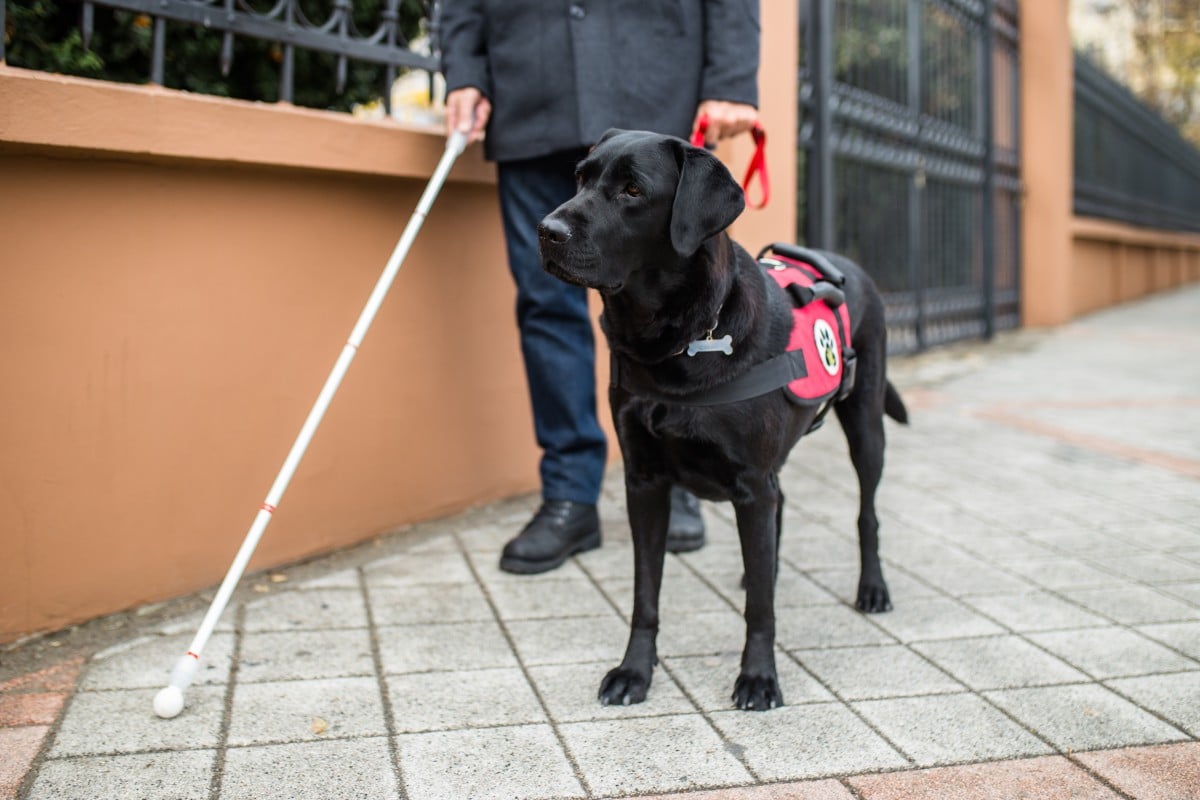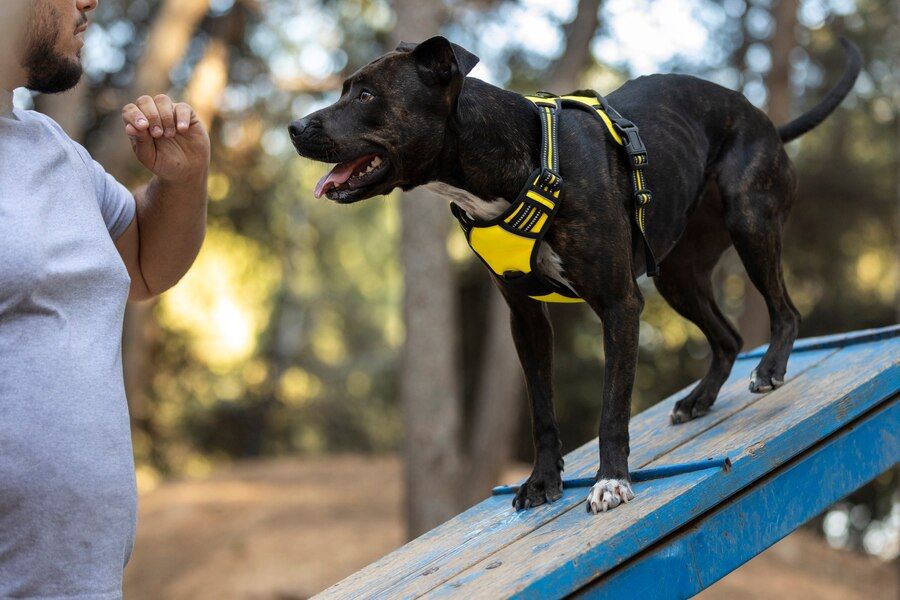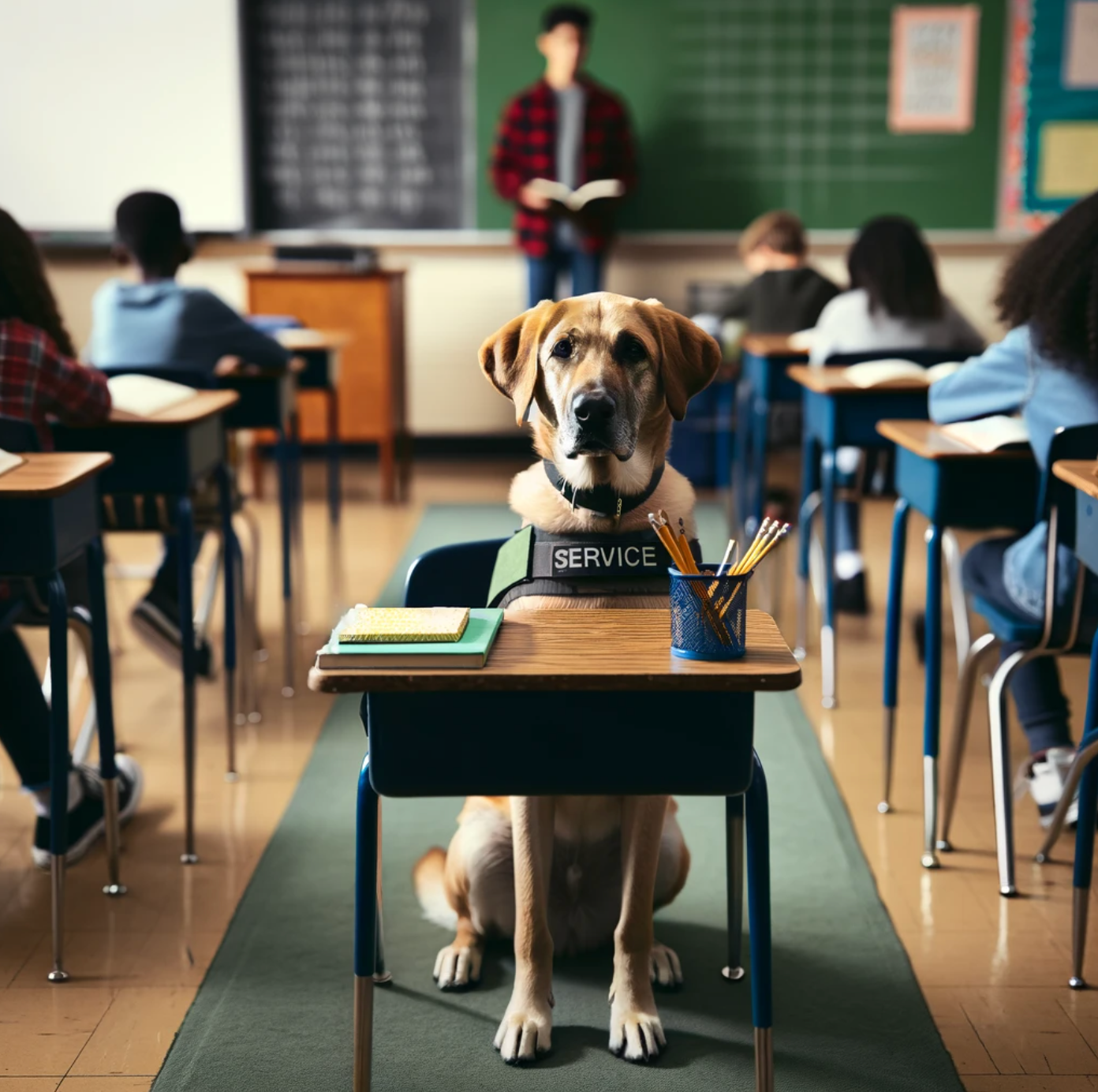Service dogs play a vital role in assisting people with disabilities. They help with daily tasks and offer companionship. So What Happens If a Service Dog Bites Someone?
But what happens if a service dog bites someone? This question raises concerns about safety, responsibility, and the law. Understanding the implications of a service dog biting someone is crucial for everyone involved. Service dogs are trained to behave well in public settings.
However, accidents can happen. When a bite occurs, it can lead to injuries and legal issues. The owner might face questions about training, management, and liability. This situation affects not only the person bitten but also the dog and its handler. We will explore the possible outcomes and responsibilities in such cases.
Table of Contents
Introduction To Service Dog Incidents
Service dogs help many people in daily life. They provide support and assistance. But sometimes, incidents can occur. What happens if a service dog bites someone? Understanding these situations is important.
Role Of Service Dogs In Public Spaces
Service dogs have a vital role in public areas. They help people with disabilities. Here are some key points:
- They assist with mobility issues.
- They provide emotional support.
- They alert to medical conditions.
- They help in social interactions.
These dogs are trained to behave well. They are usually calm and friendly. Most people appreciate their presence. Service dogs help their owners navigate everyday challenges.
Rare Instances Of Aggression
Incidents of service dogs biting people are rare. But they can happen. Here are some factors that may lead to aggression:
- Pain or discomfort in the dog.
- Fear of a loud noise or sudden movement.
- Overstimulation in crowded places.
- Protective instincts toward their owner.
When a service dog bites, it raises many questions. Who is responsible? What are the legal implications? These situations need careful handling. Understanding the context is crucial.
Service dog incidents can affect public perception. It may create fear or misunderstanding. Awareness and education help build trust. People should know that service dogs are trained for specific tasks.

Credit: martinhelms.com
Service Dogs: Training And Behavior Standards
Service dogs are specially trained animals. They assist people with disabilities. Their training ensures safety and reliability. Understanding their training helps us know their behavior.
Rigorous Training Programs
Service dogs undergo extensive training. This training lasts several months or even years. Programs focus on various skills. Here are some key aspects:
- Socialization with people and other animals
- Basic obedience commands like sit, stay, and come
- Specific tasks based on the handler’s needs
- Desensitization to different environments and situations
Training includes real-life scenarios. Dogs learn to remain calm in crowded places. They must not react aggressively. Trainers monitor their behavior closely.
Expectations Of Conduct
Service dogs must meet high behavior standards. Their conduct is crucial for safety. Here are the main expectations:
| Behavior | Description |
|---|---|
| Calmness | Service dogs should remain calm in public. |
| Focus | They must focus on their handler at all times. |
| Non-aggression | Service dogs must not bite or show aggression. |
| Social Interaction | They should interact well with others. |
Proper training helps prevent biting incidents. Handlers play a key role in their dogs’ behavior. They must reinforce good conduct at all times.
Understanding these standards is vital. It helps ensure safe interactions between service dogs and the public.
Incident Analysis: When Service Dogs Bite
Understanding what happens when a service dog bites is important. Service dogs are trained to assist people. They are usually calm and well-behaved. However, incidents can occur. Knowing the reasons behind these bites can help prevent future problems.
Triggering Factors
Several factors can lead to a service dog biting someone. Recognizing these factors is vital. Here are some common triggers:
- Fear or Anxiety: A dog may bite when it feels scared.
- Protective Behavior: Dogs may react if they sense a threat.
- Pain or Illness: A sick or hurt dog might bite out of discomfort.
- Lack of Training: Poor training can lead to aggressive behavior.
Assessing The Situation
After a bite incident, it is crucial to assess the situation. Here are steps to take:
- Check for Injuries: Look at the bite victim for any injuries.
- Evaluate the Dog: Observe the dog’s behavior after the bite.
- Identify Triggers: Determine what caused the dog to bite.
- Gather Witnesses: Speak to anyone who saw the incident.
- Consult Experts: Reach out to dog trainers or behaviorists.
Understanding these steps helps manage the aftermath. It ensures the safety of everyone involved.
Immediate Response To A Bite
When a service dog bites someone, quick action is essential. The response can affect the health of the injured person and the future of the service dog. Understanding how to react helps everyone involved.
First Aid And Medical Attention
Immediate first aid can reduce the risk of infection. Here are steps to follow:
- Stay Calm: Keep the injured person calm.
- Assess the Wound: Check the severity of the bite.
- Clean the Wound: Rinse the bite with clean water.
- Apply Pressure: Use a clean cloth to stop bleeding.
- Seek Medical Help: Go to a doctor if the wound is deep or bleeding persists.
Always monitor for signs of infection:
- Redness
- Swelling
- Pus or drainage
- Fever
Getting medical attention quickly is important. Follow the doctor’s advice for care.
Reporting The Incident
Reporting the bite is crucial. This helps ensure safety for everyone. Follow these steps:
- Notify the Handler: Inform the dog’s owner or handler immediately.
- Document the Incident: Write down details of the bite.
- Contact Authorities: Call local animal control or law enforcement.
- File a Report: Provide information about the bite to authorities.
Include these details in the report:
| Detail | Description |
|---|---|
| Date and Time | When the bite occurred |
| Location | Where the incident happened |
| Injured Person’s Info | Name and contact details |
| Dog’s Info | Name and contact of the handler |
Timely reporting can prevent future incidents. It also helps protect the service dog.
Legal Framework Governing Service Dogs
The legal framework for service dogs is complex. It involves federal laws and state regulations. Understanding these laws is crucial. They outline responsibilities when a service dog bites someone.
Americans With Disabilities Act (ada) Guidelines
The Americans with Disabilities Act (ADA) is a key law. It defines service dogs and their roles. Under the ADA:
- Only dogs trained to assist individuals with disabilities qualify.
- Emotional support animals do not have the same rights.
- Service dogs must be under control at all times.
In cases of a bite:
- ADA does not shield the owner from liability.
- Victims can seek compensation for injuries.
ADA guidelines ensure service dogs are trained. They help prevent incidents. Yet, bites can still occur. Understanding the law helps all parties involved.
State-specific Legislation
Each state has its own rules about service dogs. These laws can vary widely. Some states have stricter regulations. Others are more lenient. Key points include:
| State | Service Dog Laws |
|---|---|
| California | Service dogs must be trained and certified. |
| Florida | Service dog owners are liable for bites. |
| Texas | Service dogs must be under control to avoid legal issues. |
Victims in each state can file claims. State laws outline the process. Knowing local laws helps determine the next steps. Always consult a legal expert for guidance.

Credit: porterprotects.com
Liability And Consequences For The Owner
Understanding what happens when a service dog bites someone is crucial. Owners may face serious consequences. Liability often falls on the owner. The owner’s responsibility varies based on the situation.
Determining Fault
Determining fault in a dog bite case can be complex. Several factors influence the outcome:
- Dog’s Behavior: Was the dog provoked? Aggressive behavior matters.
- Owner’s Knowledge: Did the owner know about the dog’s aggression?
- Leash Laws: Was the dog on a leash? Compliance with laws is important.
Each case is unique. Courts often assess all circumstances. Witness statements can provide clarity. Medical records help establish injury severity.
Potential Legal Actions
If a service dog bites someone, several legal actions can occur:
- Civil Lawsuits: Victims may sue for damages.
- Insurance Claims: Homeowner’s insurance might cover incidents.
- Criminal Charges: In severe cases, charges can be pressed.
Here is a table outlining possible outcomes for the owner:
| Outcome | Description |
|---|---|
| Financial Liability | Owner may pay for medical expenses and damages. |
| Legal Fees | Costs can increase if a lawsuit occurs. |
| Increased Insurance Premiums | Insurance rates may rise after a claim. |
| Dog Restrictions | Owner might face restrictions on owning pets. |
Understanding these factors helps owners navigate responsibilities. Being informed can prevent future incidents.
Impact On The Service Dog’s Status
A service dog is a trained companion. Their main job is to assist people with disabilities. But what happens if a service dog bites someone? This incident can change the dog’s status. It can affect their work and training.
Assessment And Rehabilitation
After a bite incident, the first step is an assessment. Experts need to understand why the dog bit. Possible reasons include:
- Fear or anxiety
- Pain or illness
- Improper training or socialization
Understanding the cause helps determine the next steps. Rehabilitation might be necessary. It can include:
- Behavioral training
- Socialization exercises
- Medical checks for health issues
Professional trainers can help. They use positive reinforcement methods. This approach builds trust and corrects behavior.
Possibility Of Retraining Or Retirement
Depending on the assessment, retraining may be possible. Some dogs can return to service after proper training. Others may need to retire. Factors affecting this decision include:
| Factor | Retraining Possibility | Retirement Necessity |
|---|---|---|
| Age | Young dogs may retrain easily. | Older dogs may struggle to learn. |
| Health | Healthy dogs can retrain. | Ill dogs should retire. |
| Training Background | Well-trained dogs may adjust. | Poorly trained dogs may need retirement. |
Each case is unique. An expert evaluation is crucial. The goal is to ensure safety for everyone.
Preventive Measures And Best Practices
Preventing incidents with service dogs is essential. Understanding best practices helps ensure safety for everyone. Owners must be proactive. Education and awareness play a key role.
Education For Owners And Public
Owners must learn about service dog behavior. Training is crucial for both the dog and the owner. Here are some important points:
- Understand your dog’s body language.
- Recognize signs of stress in your dog.
- Stay updated on training techniques.
- Educate the public about service dogs.
Public awareness helps reduce misunderstandings. Teach people not to distract service dogs. This keeps the dog focused on its tasks.
Creating Safe Interactions
Safe interactions are vital for everyone involved. Here are ways to create a safer environment:
- Always ask before petting a service dog.
- Keep a distance when the dog is working.
- Teach children how to approach dogs safely.
- Use barriers in crowded places to protect the dog.
These practices help prevent accidents. Owners should practice these methods regularly. Consistency builds a safe atmosphere.
Navigating The Aftermath Of A Bite
When a service dog bites someone, the situation can be tense and confusing. Understanding what to do next is crucial. This section covers support for the victim and resources for service dog owners.
Support For The Victim
A bite from a service dog can be distressing. Victims may need immediate care and support. Here are key steps to take:
- Seek Medical Attention: Get treated for any injuries.
- Document the Incident: Write down details of the bite.
- Report the Bite: Notify local authorities if necessary.
- Emotional Support: Consider counseling for trauma.
Victims should feel safe and supported. Help is available through various organizations that focus on dog bite incidents.
Resources For Service Dog Owners
Service dog owners must also navigate the aftermath. Here are important resources:
| Resource | Description |
|---|---|
| Local Animal Control | Report the incident and understand local laws. |
| Service Dog Organization | Get advice on handling the situation. |
| Legal Assistance | Consult a lawyer for liability issues. |
| Training Resources | Improve your dog’s behavior and training. |
Understanding the rights and responsibilities of service dog ownership is vital. Owners should take proactive steps to prevent future incidents.
Conclusion: Balancing Safety And Service
Service dogs play a crucial role in helping people. They provide support and companionship. However, safety concerns arise when a service dog bites someone. Finding a balance between safety and the benefits of service dogs is essential.
The Importance Of Responsible Ownership
Responsible ownership is vital for service dog handlers. It ensures the safety of everyone. Here are key responsibilities:
- Training: Service dogs must undergo proper training.
- Socialization: Dogs need to be socialized with people and other animals.
- Monitoring Behavior: Owners should observe their dog’s behavior regularly.
- Health Care: Regular vet check-ups are necessary.
- Control: Always have control over the service dog in public.
Future Steps To Minimize Risks
Taking steps to minimize risks is essential for everyone. Here are some suggestions:
- Implement training programs focused on bite prevention.
- Encourage public awareness about service dog behavior.
- Provide guidelines for service dog access in public spaces.
- Encourage reporting of aggressive behavior to authorities.
- Promote responsible ownership through community workshops.
Balancing safety and service requires commitment. It benefits both service dogs and the community.

Credit: www.blgwins.com
Frequently Asked Questions
What Should I Do If A Service Dog Bites Me?
If a service dog bites you, ensure your safety first. Seek medical attention if needed. Report the incident to the dog’s handler and local authorities. Document the bite with photos and witness statements. This information can be crucial for any potential legal actions.
Can Service Dogs Be Held Liable For Bites?
Service dogs can sometimes be held liable for bites. The dog’s owner or handler may also share responsibility. Liability often depends on the circumstances of the incident. If the dog was provoked or acting in self-defense, liability may be reduced.
Consult legal advice for clarity.
Are Service Dogs Trained To Avoid Aggression?
Yes, service dogs are typically trained to avoid aggression. They undergo extensive training to ensure they are well-behaved in various situations. Socialization is key to their training, helping them remain calm and non-aggressive. However, any dog can bite if they feel threatened or scared.
What Are The Legal Implications Of A Service Dog Bite?
Legal implications may vary based on local laws. Generally, the dog owner may be held responsible for injuries caused by their service dog. In certain situations, the service dog’s training and behavior will be examined. Consulting a legal expert can help clarify your rights and options.
Conclusion
A service dog biting someone can lead to serious consequences. Understanding the laws around service dogs is important. Owners must train and manage their dogs well. They should also know their responsibilities. If a bite occurs, reporting it is crucial.
Seek medical help if needed. Open communication can help prevent misunderstandings. Support and education for service dog owners are vital. This ensures safety for everyone involved. Awareness and proper training can reduce risks. A well-trained service dog brings joy and assistance.
Let’s promote safe interactions with these important animals.



